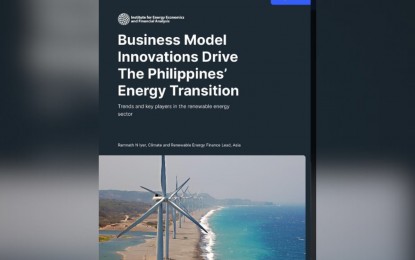
PH RENEWABLES. The cover of Institute for Energy Economics and Financial Analysis' report on the Philippines' renewable energy sector authored by its lead for climate and renewable energy finance for Asia, Ramnath Iyer. The report showed that listed companies in the Philippines accelerated the adoption of renewables. (Screenshot of the IEEFA report)
MANILA – The Institute for Energy Economics and Financial Analysis (IEEFA) expects the Philippines’ renewable energy (RE) sector to grow at a faster pace as investors’ interest in the country’s RE rises.
A report by Ramnath Iyer, IEEFA lead for climate and renewable energy finance for Asia, shows that listed companies in the Philippines accelerated the adoption of renewables, while investors put higher value on pure play RE firms compared to non-pure play renewables companies.
Iyer said there has been an enhanced interest and notable growth in the country’s RE sector in the past two years.
He said new and existing players with a track record in infrastructure and utilities have started to boost investments in renewables.
“In terms of how investors view asset values, pure play renewables companies command a valuation premium over utilities having lower levels of renewables in their mix,” he added.
IEEFA’s research said higher investor support is seen in pure play renewable companies such as Solar Philippines and Ayala’s ACEN Corp. compared to First Gen Corp. and Aboitiz Power Corp.
“Investors are willing to reward firms which plan to grow in the field of renewables and are able to execute their plans, the report finds. For example, investors value each megawatt (MW) of installed capacity at ACEN at PHP137 million (USD2.46 million) based on the market capitalization and megawatts in operation as of August 4 this year, and CREIT (CITICORE Energy REIT Corp.) at PHP102 million/MW (USD1.83 million),” IEEFA said.
“Non-pure plays First Gen Corporation and Aboitiz Power are valued at only PHP26.7 million/MW (USD479,000) and PHP73.7 million/MW (USD1.32 million), respectively,” it added.
Iyer also highlighted the country’s “history of private sector involvement in important parts of the economy”, especially in the energy sector, as they have the know-how and ability to take on and deliver the projects.
“Power generation, power distribution, telephony, transport, and airlines have all been privately owned in the Philippines for decades, unlike most of Southeast Asia, where the public sector or SOEs (state-owned enterprises) dominate these sectors,” he said. (PNA)
